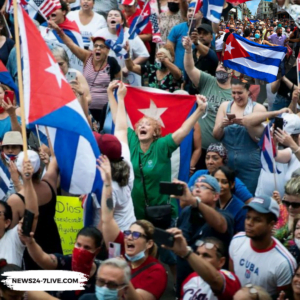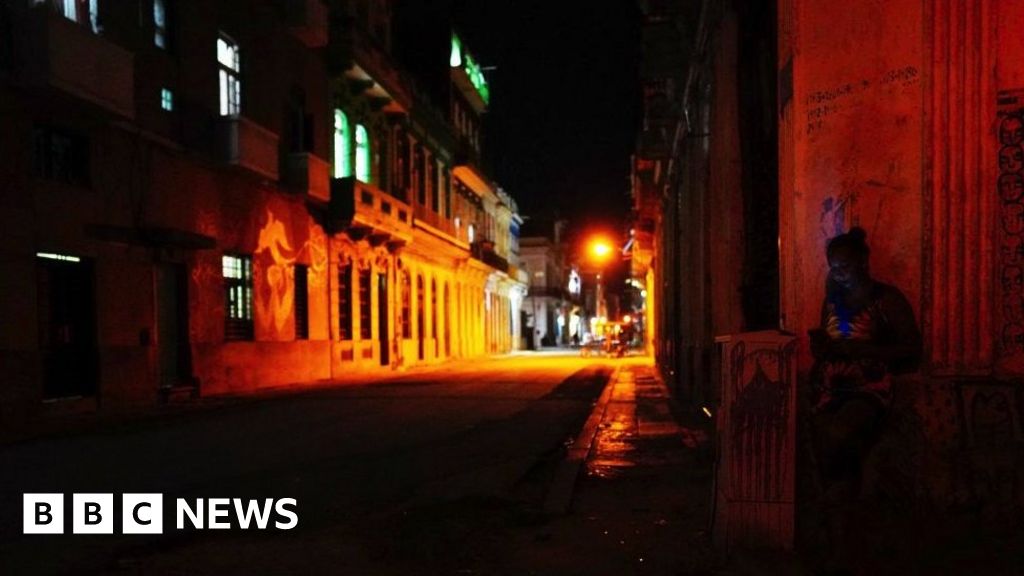Cuba saw rare street protests recently as citizens voice their grievances over food shortages and electricity outages. These protests, occurring primarily in cities such as Santiago de Cuba and Bayamo a rare display of public dissent in a nation where such acts are typically suppressed.

Also Read: European Union Announces $8 Billion Aid Package to Egypt
The protests happened when the country’s worst economic crisis in three decades exacerbated by a myriad of factors including fallout from the COVID-19 pandemic, tightening US sanctions, and structural weaknesses in the economy.
Official estimates show a 2% contraction in the economy in 2023, with a inflation rate of 30%. The cause of the protests starts from severe electricity shortages with some areas enduring up to 14 hours of blackouts daily.
These outages have been attributed to maintenance works on the Antonio Guiteras thermoelectric plant compounded by fuel shortages hindering electricity generation.
President Miguel Diaz-Canel acknowledged the protests pledging to address the concerns of the populace through dialogue.
He also warned of external forces seeking to exploit the situation pointing fingers at enemies of the Revolution based in the United States.
Deputy Foreign Minister Carlos Fernandez de Cossio went further accusing the US of attempting to destabilize the government.
The island has been struggling with power outages lasting up to 14 hours a day due to maintenance issues at the Antonio Guiteras thermoelectric plant.
A shortage of fuel further exacerbated the situation hindering the generation of electricity and the blackouts.
The country faces its worst economic downturn since the collapse of the Soviet bloc in the 1990s, aggravated by the COVID-19 pandemic, tightening US sanctions, and structural weaknesses in the economy. Official figures show a 2% economic contraction in 2023, with an inflation rate of 30%.
Also Read: Vladimir Putin Wins in 2024 Russian Presidential Election
The risk of reprisal in a country where protests are typically suppressed citizens took to the streets in Santiago de Cuba and other cities, demanding power and food.
President Miguel Diaz-Canel acknowledged the protests expressing a willingness to engage in dialogue with the people and address their concerns.
Government officials attributed the unrest to external actors, accusing “enemies of the revolution” and “US-based terrorists” of instigating the protests to destabilize the government.
The US embassy in Havana acknowledged the peaceful nature of the protests and urged the Cuban government to respect the human rights of demonstrators. Bruno Rodriguez rejected foreign interference urging the US not to meddle in Cuba’s internal affairs.
Chronic shortages of fuel, food, and other essentials have become a daily reality for many Cubans, exacerbating their hardships.
The government implemented economic measures including a more than 400% increase in fuel prices, as part of its recovery plan.
The country sought assistance from international organizations, such as the UN’s food program to alleviate food shortages particularly among vulnerable populations like children under seven.
The US embassy in Havana expressed support for the protesters, urging the Cuban government to respect their human rights and address their grievances.
This stance underlines ongoing tensions between the two nations with the US maintaining economic sanctions against Cuba since 1960.
These protests evoke memories of the historic demonstrations in July 2021, which saw thousands take to the streets in the largest anti-government protests since the Cuban revolution.
Also Read: Japan Same-Sex Marriage Ban Ruled Unconstitutional by Courts























